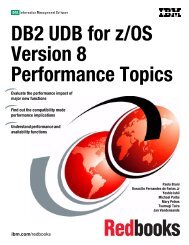The IBM eServer BladeCenter JS20 - IBM Redbooks
The IBM eServer BladeCenter JS20 - IBM Redbooks
The IBM eServer BladeCenter JS20 - IBM Redbooks
You also want an ePaper? Increase the reach of your titles
YUMPU automatically turns print PDFs into web optimized ePapers that Google loves.
8.1.3 Using Director to manage <strong>JS20</strong>s<br />
With the agent installed, you can add the <strong>BladeCenter</strong> <strong>JS20</strong> to the Director<br />
console as another managed server. For details about how to do this, see the<br />
<strong>IBM</strong> Director 4.12 Installation and Configuration Guide, SC09-P290-50.<br />
<strong>The</strong> following subset of Director management features are available for the<br />
<strong>BladeCenter</strong> <strong>JS20</strong>:<br />
► Software Distribution Standard Edition<br />
► Software Distribution Premium Edition<br />
► Update Assistant<br />
► Inventory Hardware<br />
► Inventory Software<br />
► Event Action PLans<br />
► Hardware Health Status<br />
► Resource Monitors<br />
► Eventlog<br />
► Agent Discovery<br />
► Process Management<br />
► SNMP Alerts<br />
► SNMP Browser<br />
► Rack Manager<br />
► Remote Session<br />
► File Transfer<br />
8.2 <strong>IBM</strong> Cluster Systems Management<br />
<strong>BladeCenter</strong> <strong>JS20</strong> installations may involve clusters of many blade servers. Many<br />
of these installations use <strong>IBM</strong> Cluster Systems Management to both install and<br />
manage <strong>BladeCenter</strong> <strong>JS20</strong>s.<br />
CSM for Linux has been under development since early 2000 and was first<br />
released as a product in June 2001. <strong>The</strong> original requirement for this product was<br />
to provide common cluster management for Linux and AIX, leveraging <strong>IBM</strong>’s<br />
existing cluster software portfolio to work with Open Source packages and best<br />
practices from the Linux cluster market.<br />
CSM provides basic cluster management functions, such as hardware control<br />
and operating system and software installation. It also provides significant<br />
value-added functions such as configuration file management, a robust<br />
monitoring infrastructure, automated event management, diagnostic probes, and<br />
common management of AIX and Linux clusters.<br />
Chapter 8. System management scenarios 147
















